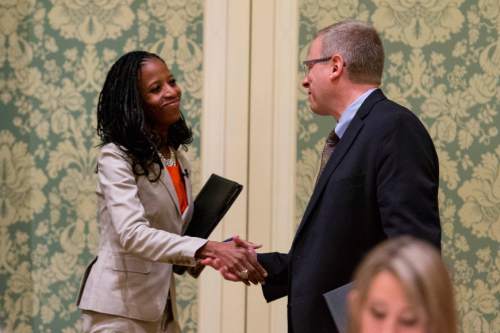This is an archived article that was published on sltrib.com in 2016, and information in the article may be outdated. It is provided only for personal research purposes and may not be reprinted.
In their first contest, Rep. Mia Love rarely even mentioned Democrat Doug Owens' name and never attacked him.
Now two years later, even as recent polls show her with a significant lead in Utah's 4th Congressional District, Love has gone on the offensive.
She has released a TV ad criticizing Owens' involvement in a lawsuit 15 years ago that delayed construction of Legacy Parkway. The 30-second spot ends with the tag line: "Doug Owens: He is not on our side."
"The voters have a right to know what he has done and what he has stood for in the past," said Dave Hansen, Love's campaign strategist. Hansen said the ad shouldn't be construed as a sign Love is worried Owens is gaining on her. Instead, the first-term Republican congresswoman is sticking to her campaign plan created a year ago.
"We are not going to take anything for granted in this campaign," Hansen said. "We are going to run full out and do what we need to do."
The new spot comes out just a few days after the Cook Political Report moved the 4th District race from a "tossup" to "lean Republican." That move came after a poll commissioned by the Utah Debate Commission had Love up 19 percentage points, her biggest lead so far.
She beat Owens in 2014 by just 5 percentage points, and their rematch is expected to be the closest federal race in the state. It is the only contest in Utah where both major-party candidates are airing TV ads.
"Mia Love's campaign must be worried. They're resorting to misleading, personal attacks straight out of the Washington, D.C., playbook," said Taylor Morgan, Owens' campaign spokesman. "Doug Owens is running a different kind of campaign — one that is focused on solving problems and sharing a positive vision for Utah's future."
Owens has released two ads, both heavily emphasizing his Mormon pioneer roots. Neither mentions Love. But in 2014, he criticized Love for having an "extreme" position on public education, including her support for eliminating the U.S. Department of Education.
Love's team vowed to be more aggressive in 2016, and this new TV ad is the first sign her campaign meant it.
"You don't usually see negative ads come out when you have a good comfortable lead," said Jason Perry, director of the Hinckley Institute of Politics. He has a few suggestions as to why Love's campaign might veer in this direction. It is possible that Love's lead is smaller than the most recent polls have indicated or she could want to bolster her numbers early.
"One of the other reasons could be to get ahead of negative ads that could come from your opponent, essentially striking first," he said.
The Utah Republican Party previously sent a fundraising email hitting Owens on the Legacy Parkway, calling him "one of the extreme environmentalists." Love's ad isn't that pointed, but it ties Owens to former Salt Lake City Mayor Rocky Anderson and "a radical environmental group," a reference to the Sierra Club. All three were involved in the lawsuit that stalled the project and led to a $250 million increase in the road's overall price tag. It also resulted in significant changes to the road's design — including a 55 mph speed limit, noise-reducing pavement on the highway limited to just four lanes, the exclusion of semi-trucks and fast tracking of the commuter rail line known as FrontRunner.
While Love's ad blames cost increases on environmentalists, environmentalists blame the state for moving ahead on a road that would have illegally threatened wetlands near the Great Salt Lake.
Owens was among a team of lawyers representing Utahns for Better Transportation, which wanted the highway project scrapped for a commuter train. Anderson and the Sierra Club later joined the suit.
Morgan, responding directly to the ad, said: "The facts on Legacy Highway are clear: Doug stood up to the federal government to protect Utahns' rights, voices, and tax dollars when federal bureaucrats broke the law. The court ruled for Utah and held the federal government responsible for the costs involved."



